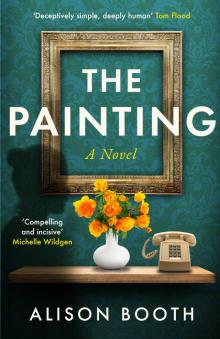- Home
- Alison Booth
A Perfect Marriage Page 6
A Perfect Marriage Read online
Page 6
My watch says twelve-twenty. Only forty minutes before the meeting, and it will take ten minutes to get there. I look out the window at the low sky that is the colour of over-washed aluminium.
I’ve almost forgotten what Anthony looks like. I try to conjure up his image but can’t. Sitting at the computer I type in the website address for Imperial College, and after several more clicks retrieve Anthony’s picture, there, in the top left-hand corner of his homepage. Once more I have that feeling of recognition. He must remind me of someone, but I can’t think who. This photo appears to have been taken some years ago. Anthony’s face is three-quarters turned to the viewer and he is smiling, showing white teeth. His hair is darker than when I met him. On the screen his eyes look grey, and not the vivid blue that I remember; grey like the October sky outside.
Idly I examine his features again, as if I have all the time in the world. Perhaps Anthony is vain; this is a very flattering image. Then I think of my own homepage and how I want to avoid having the college photographer – one of the physics technicians – take a picture of me. Some of my colleagues have had three or four visits to the technician’s office before they’ve been satisfied. The departmental head would have gone in for air brushing if it had been available.
We are none of us perfect.
After shutting down the website, I pick up the phone. Before my hand has time to start shaking, I dial the number Kate gave me. After several rings, there is a click, and more ringing until the phone is picked up by the departmental administrator. No, she informs me, Anthony Blake is not in. He won’t be back until tomorrow. I leave her my home number. She has trouble understanding my last name until I spell it out for her. ‘Ah, Larcklan,’ she says, as if I have mispronounced my own name, ‘Sally Larcklan.’
So that is it. I have done it, but I am no further forward. And I shall be late and uninformed for the meeting. It is almost one o’clock.
I have spent half an hour dreaming in front of a computer screen.
Chapter 12
THEN
Jeff and I had been separated for over six months and I was two years into my PhD before I decided to do some research on domestic violence. ‘Battered women,’ I typed into the library’s search facility. Twenty references appeared on the computer screen, and I scrolled through them quickly. The few survey references seemed the most promising. Two of them were in the college library and the others were in Senate House. I chose the Senate House library because I didn’t want to see anyone I knew. This literature search was one to conduct in private. It certainly wasn’t part of my thesis on stem cells. I printed out a page with the references and library shelf codes of the books that looked interesting, and stuffed it into my bag.
At Senate House I was lucky: all the books I wanted were where they should have been on the library shelves. This state of affairs wouldn’t last long; after term started volumes would go missing, shoved by undergraduate students into remote crannies so that only they could retrieve them. I spread the books on a table next to the sociology stacks. Most of the articles were in a jargon I found unappealing, but at last I found one – the most recent – that I could relate to. I took brief notes.
‘Hello, Sally,’ said a loud voice with an Italian accent.
Startled, I put my hand over my notes before looking up. Silhouetted against the bright light was my friend Alessandra. Although she was finishing a PhD on socio-biology, it had simply not occurred to me that she might hang out in the sociology section of Senate House library.
‘What are you doing here?’ She didn’t bother to disguise her curiosity. Leaning across me, she read aloud the title of the article in the volume of readings in front of me. ‘The social construction of deviance: Experts on battered women. I didn’t know you were into social deviance.’
Bloody hell, do I look like I’m into social deviance? At a loss for polite words, I sat open-mouthed like a student being asked a question in a lecture.
This taciturnity didn’t matter with Alessandra. She always had enough words for two and that was one of the things I liked about her. If you didn’t want to talk, you could let her words roll over you and sweep you along on a relaxing journey that you could choose to dip in or out of.
‘Such an important area. I expect it has some parallels with chimpanzees.’ Alessandra’s research area was evolutionary biology and feminism. She was prone to draw parallels between human behaviour and that of chimpanzees, an endearing trait that my mother was also inclined to follow but from a vantage point that was less flattering to human beings than Alessandra’s.
‘I know the woman who wrote this chapter,’ Alessandra added. ‘She’s one of my supervisors. She’s made quite a name for herself.’
I shut the book and looked at the clock on the wall behind Alessandra’s head.
‘Are you leaving?’ she said as I stood up. ‘I’ll walk with you. I’m taking a class at two o’clock.’
We clattered out of the library, Alessandra chatting all the while. Several people looked at us, their faces puckered with disapproval. One of them shushed but to no avail.
‘What was the article about?’ Alessandra said when we reached the stairwell.
‘It’s saying that once a woman admits she’s a victim of wife assault, she’s viewed as deviant if she stays with her partner.’ The article was beginning to really annoy me. That was me, deviant.
‘Double jeopardy,’ Alessandra said as we wound our way down the staircase. ‘I can see the logic.’ She was puffing a bit now, although that didn’t interrupt her flow. ‘Society expects still-married people to stay together, in spite of high divorce rates. But it doesn’t expect battered wives to stay. So if they don’t, they’re deviant.’
Alessandra’s discussion of this topic at such high volume was making me feel stressed and my heart began to thud. At last we reached the white travertine lobby of Senate House, softly lit by its brass light-fittings.
‘Your supervisor knows how to make a point,’ I said, as we paused on the pavement outside. ‘She reckons that battered women are twice attacked. First by their husbands and then by social workers who say they should have left their husbands.’
‘Seems a bit strong,’ Alessandra said. ‘Social workers are there to provide support not judgements.’
‘I suppose they do.’ As I peered up at the white tower of Senate House rising into the insipid grey sky, I wondered if this was true.
‘Would you like to do lunch next week?’ Alessandra said. ‘I can tell you all about this latest stuff on genes and feminism.’
‘Love to. And I can tell you all about Josh Klemperer’s plans to get armies of undergraduates breeding rats that rape and rats that are altruistic, so he can compare their genetic structure.’
She laughed. At first I thought she didn’t believe me.
‘But I know all about that,’ she said, as she waved good-bye.
Chapter 13
NOW
The streets are crowded with people marching towards the Tube station, but their pace is too slow for someone who has been listening all afternoon to the finer points of the new e-mathematics degree scheme. I weave my way around pedestrians going my direction and avoid eye contact with people coming towards me. This is how to avoid being forced off the footpath; if they think I haven’t seen them, they duck away at the last minute, averting disaster.
Once across Euston Road, I steer clear of the main thoroughfares. The side streets are almost completely devoid of people. I stride out towards Regent’s Park and on to Primrose Hill, and feel my spirits lifting the further I get from Gower Street.
I take a detour to the top of Primrose Hill and look out across London. To the south, an army of purple and black cumulus clouds is forming, and shortly it begins to march forward, driving in front of it wisps of fluffy grey cloud in panicky retreat. As I watch, the grey sky above turns a bruised yellow and soon this is obliterated by the ranks of advancing black clouds. There is something exciting about the approach of this
storm; it’s almost as if it might herald a new phase of my life. Exhilarated, I breathe deeply before racing down the hill.
‘Spare us some change?’ says the emaciated young man standing at the bottom, his hand outstretched. Absent-mindedly I dig in my coat pocket and find a couple of coins to give him. By the time I turn towards home, the sky is completely overcast. The first flash of lightning slices through the dense clouds and a moment later, as I reach our street, I hear the rumble of thunder. By the time I reach our house, fat raindrops are starting to fall.
As I unlock the front door, I smell onions and garlic. I run downstairs to the kitchen and find Charlie making a risotto. She puts out her arms for a hug; I always try to put my arms over her shoulders when we embrace, pretending that I’m still taller than she is, though it has been two years since she overtook me. And then, after a little mock battle that Charlie always wins, I hug her from below.
‘There’s a message for you on your desk,’ she says. ‘An Anthony Blake. Quite chatty. He’s rung twice. Left his number.’
‘He called here?’
‘Yeah. Like, I couldn’t have spoken to him if he hadn’t. He wants you to call back. Said to tell you it’s a different number to the one you tried before.’
‘Perhaps I’ll have a glass of wine first. And Charlie, thanks for doing dinner, you’re a darling.’
‘Cool, Ma.’ Charlie stirs the onions, which are softening in the pan. The salad is on the table already. ‘You’ve got fifteen minutes,’ she continues, mimicking the way I speak. ‘That’ll stop you wittering on and running up the phone bill.’
I pour myself a glass of wine and surreptitiously knock back half in a couple of gulps while Charlie is engrossed in her stirring. When I go up the two flights to my study, I take the glass with me. Charlie has written, on the notepad next to the phone, Anthony’s name and number in large block letters. Around the words she’s drawn a scalloped border, coloured in with the green fluorescent pen that I keep in the jar on my desk. Around this border she’s added some variants of Anthony’s name, as she always does with any caller: there is Ant Blake, Tony Baloney, Tone the Drone, and The Blake Bloke. At the bottom of the page she has written in red ballpoint: Don’t be Alone, Phone Tone the Drone! I transcribe his number to another piece of paper before dialling. After three rings the phone is answered.
‘I’m so glad you called back.’ Anthony’s voice is deeper than I remembered. ‘I was starting to wonder if you’d forgotten me.’
‘Of course I haven’t forgotten you. I really hoped you’d phone me.’
‘I tried to call you a couple of times at your office last week but each time the administrator said you were lecturing. I didn’t leave a message. I was ringing from Boston and I thought it might be hard for you to return the call. And I tried to send you an e-mail last week but it bounced back.’
‘We had problems with our server last week.’
‘I’m giving a talk at a conference in Stockholm on Saturday week. I could stop in London on the way if you’re free for dinner on the Friday night. Then I could get the early morning flight to Stockholm the next day.’
‘How lovely!’ But at that moment I remember the dinner party I’m committed to that evening, given by the head of my department. For one glorious second I imagine taking Anthony with me but dismiss it an instant later. Could I tell the head I’m unable to come after all? Impossible: I like him and his wife and they invited me weeks ago; there’s no way I can get out of that dinner without risking offence. Someone on the academic grapevine would be sure to see me with Anthony that same evening. And there’s my promotion application coming up; I can’t afford to jeopardise this.
After I explain some of this to Anthony, he says, ‘Let’s do Friday lunch.’
He is easy to talk to on the phone. After a few minutes I feel so relaxed that I lie down on the Balochistan rug and in next to no time Charlie is at the door to tell me the risotto is ready.
‘She sounds delightful, your Charlie,’ says Anthony. I laugh; evidently Charlie did not try out any of the alternative names for him that she’d written on the margins of her message.
‘Who is he?’ Charlie says when I return to the kitchen.
‘Someone I met at the conference in Spain. He’s been at Harvard since then, on leave for the term. He’s coming back here again at the end of next week.’
‘Cool. What was so urgent?’
‘He’s asked me out to lunch. On Friday week.’
‘Oh,’ Charlie says. ‘Lunch is not exactly exciting. Or urgent. You often have lunch with people.’
‘This is a special lunch, at a special place.’ I name a restaurant that even I know is rather fancy, because it’s one that Zoë often eats at. ‘Such a nice man,’ I add, and smile at Charlie.
‘A proper man,’ Charlie says. ‘Like, not a boy.’
‘Not a boy,’ I repeat slowly, shocked by her remark. Perhaps she meant it as a joke, but it starts me wondering what Zoë has been telling her. I set the table and pour myself another glass of wine.
‘He’s got loads of gravitas,’ Charlie adds; she is trying to make amends by using the expression I often use about some of my more pompous colleagues.
‘Gravitas,’ I repeat, laughing now. My moment of anxiety has gone. Surely Zoë wouldn’t have gossiped to Charlie about my unsuitable past boyfriends.
Chapter 14
THEN
Jeff was working hard, staying late at the office a couple of nights a week. We no longer had any money worries: his practice was doing well and I was supported by my PhD studentship. One evening in late spring, I decided to surprise him in his office, to take him something nice to eat; a gesture not of love, but of coexistence. I lined up the babysitter and caught the bus into Covent Garden.
Sitting upstairs at the front of the double-decker bus, I watched the crowds of people milling along the streets after work. On my lap was a basket with a picnic in it: smoked salmon and fresh crusty bread, a green salad with the chilli-soaked black olives that Jeff loved, and a bottle of cold dry white wine. I felt such a delightful glow of anticipation, more at the prospect of summer than of surprising Jeff.
There was no one about in Jeff’s building, a large terraced house not far from Long Acre. After unlocking the main door, I walked up the stairs to his office. It was on the top floor, and connected to the landing by a wall of plate glass. His office lobby was lit with spotlights and furnished only with a reception desk and a black leather couch. It was like a stage set. All very minimalist.
When I saw the figures on the couch I stopped still. Though I wanted to run back down the stairs again and out into the warm evening, I couldn’t move my legs. I was stuck there on the landing, right under one of the down-lights, so that I too would have been fully illuminated. I was shocked at the sight of Jeff on the couch. A woman was straddling him. They were both naked under the blazing spotlights.
Although the woman’s face was turned away from me, I knew from the shape of her head that I’d never seen her before. She had a long neck and short platinum blonde hair, and her skin was tanned: I could see the marks from a bikini.
I stood there, frozen on the landing, watching this woman ride my husband hard. And then Jeff looked up at me. He saw me, I swear he did. I will never be able to forget the way he stared at me. Detached, caught up in the act of sex. But triumphant too. He had struck me another blow. He found that exciting, and he found it exciting that I was watching.
And he smiled. He smiled at me not at her. An instant later they both climaxed. She shrieked as she climaxed, this woman, she shrieked. Quite uninhibited, although she didn’t know I was there. But Jeff did. He watched me observing him being unfaithful. And he was happy that I’d seen him.
His expression when he saw me shocked me. This and the infidelity left me shaking. It was as if a prop that had been keeping me upright had been removed in a heartbeat, leaving me without any support. Somehow I made my way down the stairs and out of the building. There
was a homeless man sitting on a heap of cardboard just down from the bus stop. When I gave him the picnic basket, he mumbled a reply but I couldn’t hear the words.
I leaned against the shelter by the bus stop. My legs were trembling still and my stomach beginning to churn. Jeff was fundamentally nasty. Was it the infidelity that bothered me? I didn’t think so. If our marriage had been strong, we could have weathered this and stayed together. I’d known for some time that Jeff was capable of physical cruelty and I’d also learned of his mental cruelty. But his smile as he had sex with that woman while I watched had taken this to a new level.
I suppose it was the realisation that he was intrinsically nasty as well as quick-tempered that made it easy to reach a decision. We couldn’t carry on together any longer.
* * *
The babysitter was surprised when I got home earlier than she’d expected. I could tell she wasn’t all that happy to be interrupted in the middle of the DVD she was watching. ‘Take it with you,’ I said as I fumbled in my purse, and found enough to give her an extra hour’s pay. After she’d gone home – she lived with her parents around the corner – I phoned the YWCA and booked a twin room for Charlie and me. I took down two suitcases from the loft, and filled one with my clothes that I pulled at random out of the wardrobe. Only when I was about to close the lid did I remember my laptop with all my files. I put it on top of my clothes and toiletries, and shut the suitcase.

 The Painting
The Painting The Philosopher's Daughters
The Philosopher's Daughters A Distant Land
A Distant Land A Perfect Marriage
A Perfect Marriage Stillwater Creek
Stillwater Creek The Indigo Sky
The Indigo Sky